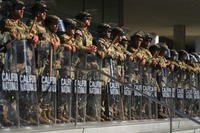Joseph Dyer is a disabled Navy veteran who served as a helicopter mechanic and was injured in the line of duty. He now works as a forensic investigator for the Department of Homeland Security's Human Exploitation Rescue Operative (HERO) program, which offers veterans free cybersecurity training and certification prep courses.
Like many veterans, Dyer's transition was rocky. After he was medically discharged in 2005, he attended college to pursue a degree in criminal justice. But even though he had a transition plan, he wasn't prepared when his post-9/11 GI Bill money ran out.
Dyer turned to the Department of Veterans Affairs' vocational rehabilitation program for help. His counselor guided him to the HERO program. With a little research, he applied, interviewed and was accepted.
While working as a forensic investigator for the DHS wasn't on his radar, he says veterans would do well to always stay open to any opportunity that presents itself.
"Transitioning out of the military is difficult, even for those who are the most prepared," Dyer said. "You never know what can happen, and so vets need to keep their options open."
How can veterans have a successful transition like Dyer? Here are his tips:
1. Take Your Transition Seriously and Prepare Accordingly.
If not, you may struggle more than you need to. Dyer suggests preparing for your transition a minimum of a year before your Expiration Term of Service (ETS), perhaps even earlier if you know that you're not making the military a lifetime career. Start simple.
Create a list of jobs you might want to do and, if you don't know, start by asking yourself these questions:
- Do you enjoy your current military occupational specialty (MOS)?
- What specifically do you enjoy?
- Are there civilian equivalent jobs?
Check Military.com's Personality and Skills Translator and transition guides to help you through this process.
2. Semper Gumby. Be Flexible.
Prepare yourself to grab opportunities, even if they fall outside of your action plan. It's necessary to build and execute an action plan to reach your objectives, but don't fixate on the details so much that you lose sight of your objective or other opportunities that may arise.
3. Get a Hobby.
Dyer says he leaves the stresses of his job at the office. His hobby of choice is painting. Some of his work is even hung in the office where he works, so that others can be reminded of their life outside of the harsh reality of chasing down child predators.
A hobby can help veterans deal with the stress of their transition. And once veterans have their stressors under control, it's easier to focus on their civilian career.
Find the Right Veteran Job
Whether you want to polish your resume, find veteran job fairs in your area or connect with employers looking to hire veterans, Military.com can help. Subscribe to Military.com to have job postings, guides and advice, and more delivered directly to your inbox.















